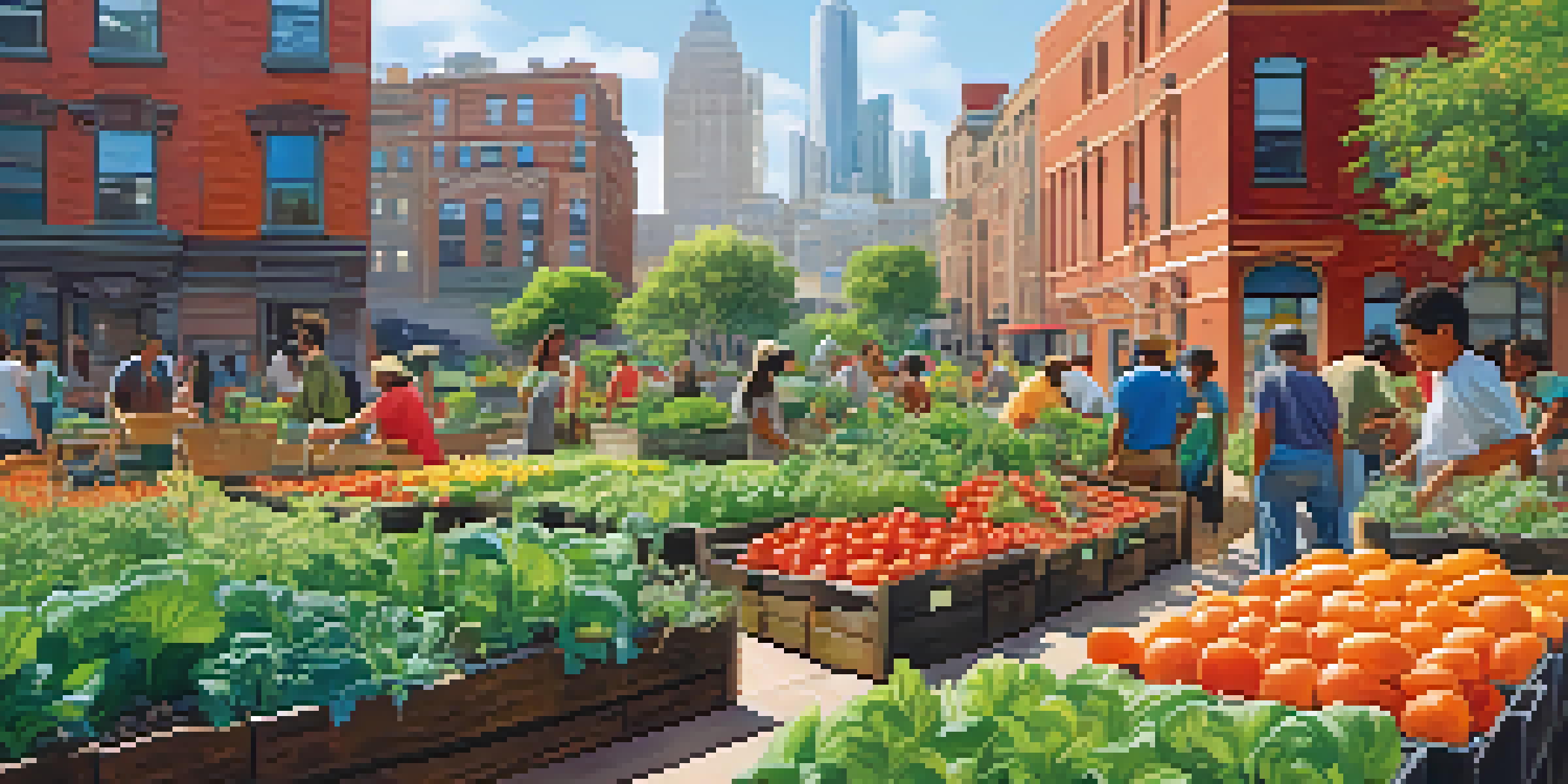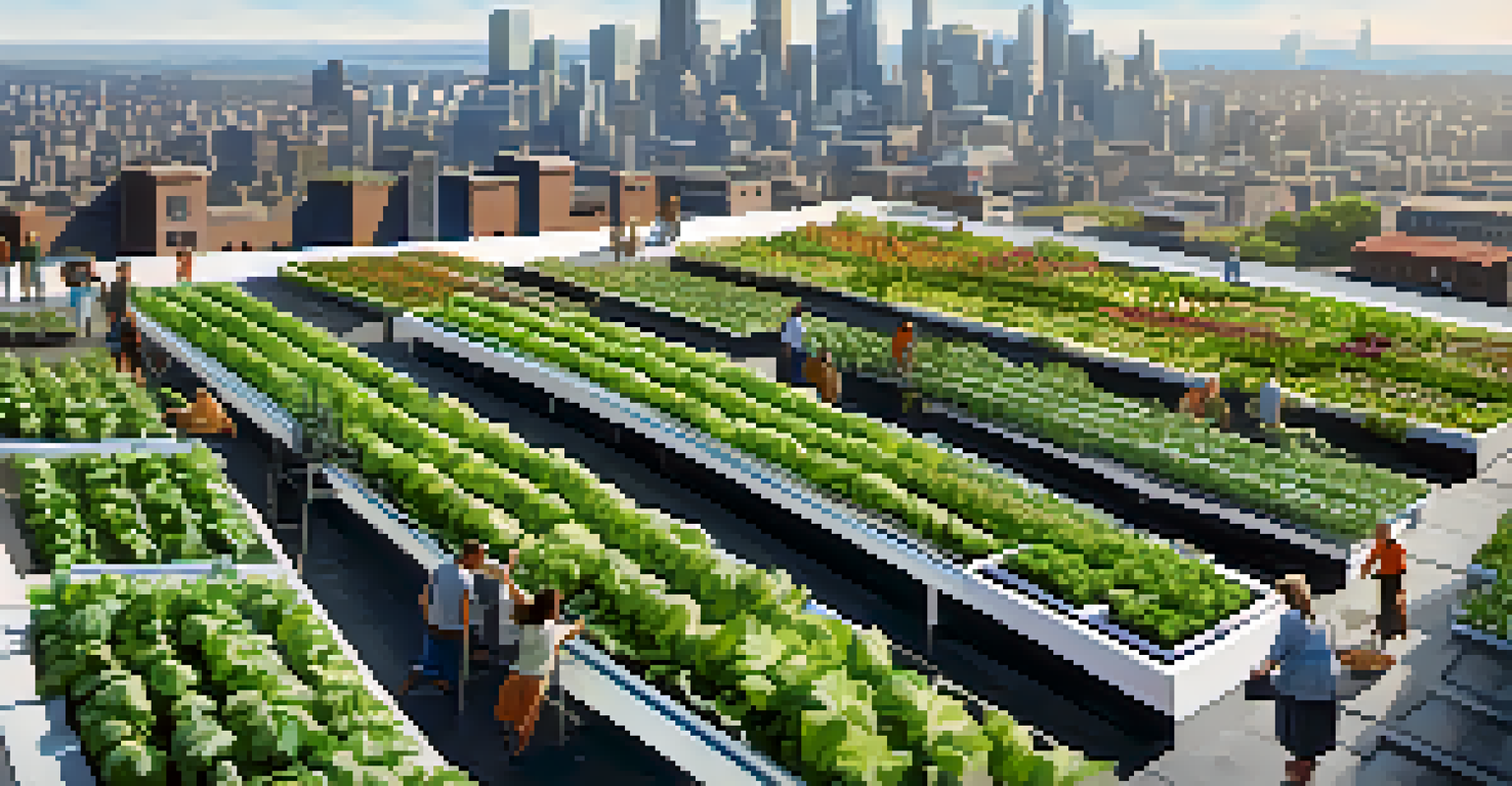The Role of Vegetables in Mitigating Climate Change Effects

Understanding Climate Change and Its Impact
Climate change is a pressing global issue, primarily driven by greenhouse gas emissions. These emissions come from various sources, including burning fossil fuels and deforestation, leading to global warming and extreme weather patterns. As the planet heats up, we see more frequent droughts, floods, and storms that disrupt ecosystems and human life.
We won't have a society if we destroy the environment.
The effects of climate change are not just environmental; they also impact our health, economy, and food security. For instance, rising temperatures can affect crop yields, leading to food shortages and increased prices. Communities around the world are already feeling the brunt of climate-related challenges, making it essential to find effective solutions.
One often-overlooked solution to mitigating climate change effects is the role of vegetables. By incorporating more plant-based foods into our diets, we can reduce our carbon footprint and promote sustainable agricultural practices that benefit both the environment and our health.
The Power of Plant-Based Diets
Adopting a plant-based diet can significantly decrease greenhouse gas emissions. The production of vegetables generally requires fewer resources and emits less carbon than animal-based foods. For example, producing one pound of beef generates about 20 times the greenhouse gases compared to one pound of vegetables.

Moreover, plant-based diets are not only beneficial for the planet but also for our health. They can reduce the risk of chronic diseases such as heart disease, diabetes, and obesity. By choosing vegetables over meat, we can nourish our bodies while also making a positive impact on the environment.
Climate Change Needs Urgent Solutions
Addressing climate change is crucial as its impacts extend beyond the environment, affecting health, economies, and food security.
As more people shift towards plant-based diets, the cumulative effect can lead to a substantial reduction in emissions. This collective change can send strong signals to industries to invest in sustainable farming practices and reduce their carbon footprints.
Sustainable Farming Practices
Sustainable agriculture focuses on growing food in a way that preserves the environment, supports fair labor practices, and ensures food security. Techniques such as crop rotation, permaculture, and organic farming help maintain soil health, reduce water usage, and minimize toxic pesticide application. By prioritizing these practices, we can cultivate vegetables that are not only nutritious but also environmentally friendly.
The greatest danger in times of turbulence is not the turbulence; it is to act with yesterday's logic.
Additionally, sustainable farming can lead to increased biodiversity, which is crucial for ecosystem resilience. Diverse crops can better withstand pests, diseases, and climate fluctuations, thus ensuring stable food production. This diversity also supports wildlife, contributing to the overall health of our planet.
By choosing to buy vegetables from sustainable farms, consumers can support practices that mitigate climate change. This choice not only impacts our health but also sends a message to farmers and retailers about the importance of sustainability in food systems.
The Role of Urban Gardening
Urban gardening, including community gardens and rooftop farms, is gaining popularity as a way to grow vegetables in cities. These initiatives can reduce food miles, meaning less transportation emissions, and provide fresh produce to local communities. Growing food closer to home helps mitigate the effects of climate change by cutting down on the carbon footprint associated with food transportation.
Furthermore, urban gardens can help improve air quality and provide green spaces in densely populated areas. They can serve as a sanctuary for pollinators, such as bees and butterflies, which are essential for maintaining healthy ecosystems. This connection between urban gardening and environmental health emphasizes the importance of integrating nature into our cities.
Plant-Based Diets Reduce Emissions
Shifting towards plant-based diets can significantly lower greenhouse gas emissions and promote better health.
Additionally, urban gardening fosters community engagement and education about sustainable practices. By involving residents in growing their own food, these projects raise awareness of climate change and empower individuals to make environmentally conscious choices.
Vegetables and Carbon Sequestration
Plants, including vegetables, play a vital role in carbon sequestration—the process of capturing and storing atmospheric carbon dioxide. Through photosynthesis, vegetables absorb CO2 and release oxygen, helping to reduce the overall concentration of greenhouse gases in the atmosphere. This natural process is crucial in combating climate change and promoting a healthier planet.
In addition to growing vegetables, practices such as composting and maintaining healthy soil can enhance carbon sequestration. Healthy, organic soils can store much more carbon than degraded soils, making sustainable farming practices even more critical. By enriching our soils with organic matter, we can boost their ability to sequester carbon effectively.
By prioritizing the cultivation of vegetables with carbon-sequestering practices, we can contribute to climate change mitigation. This approach not only helps the environment but also improves soil health, leading to more productive and resilient agricultural systems.
Promoting Vegetable Consumption
Encouraging people to eat more vegetables is essential for both health and the environment. Governments, organizations, and communities can promote vegetable consumption through education, cooking classes, and campaigns that highlight the benefits of a plant-based diet. These initiatives can help shift public perception and encourage more individuals to make sustainable food choices.
Moreover, making fresh vegetables accessible and affordable is crucial for increasing consumption rates. Supporting local farmers' markets and community-supported agriculture (CSA) programs can provide residents with fresh produce while also bolstering local economies. When people have easy access to healthy foods, they're more likely to incorporate them into their diets.
Sustainable Practices Enhance Resilience
Adopting sustainable farming and gardening practices not only supports biodiversity but also helps mitigate the effects of climate change.
Additionally, sharing recipes and meal ideas that showcase the versatility of vegetables can inspire creativity in the kitchen. By showing how delicious and satisfying plant-based meals can be, we can motivate more people to embrace a vegetable-rich diet.
The Future of Food Systems and Climate Action
As we look towards the future, integrating vegetables into our food systems is vital for addressing climate change. This integration involves not just individual dietary choices but also systemic changes in agriculture, transportation, and food policy. The more we prioritize sustainable practices, the more resilient our food systems will be in the face of climate challenges.
Innovations in agriculture, such as vertical farming and hydroponics, offer exciting possibilities for producing vegetables in urban areas. These methods can maximize space and resources while minimizing environmental impact. Embracing such technologies can help ensure that fresh produce remains available, regardless of climate fluctuations.

Ultimately, the role of vegetables in mitigating climate change goes beyond nutrition; it's about fostering a sustainable future. Every small change we make, from our individual diets to larger policy shifts, contributes to a collective effort to combat climate change and protect the planet for future generations.